Does TikTok threaten national security? The case of Ukraine
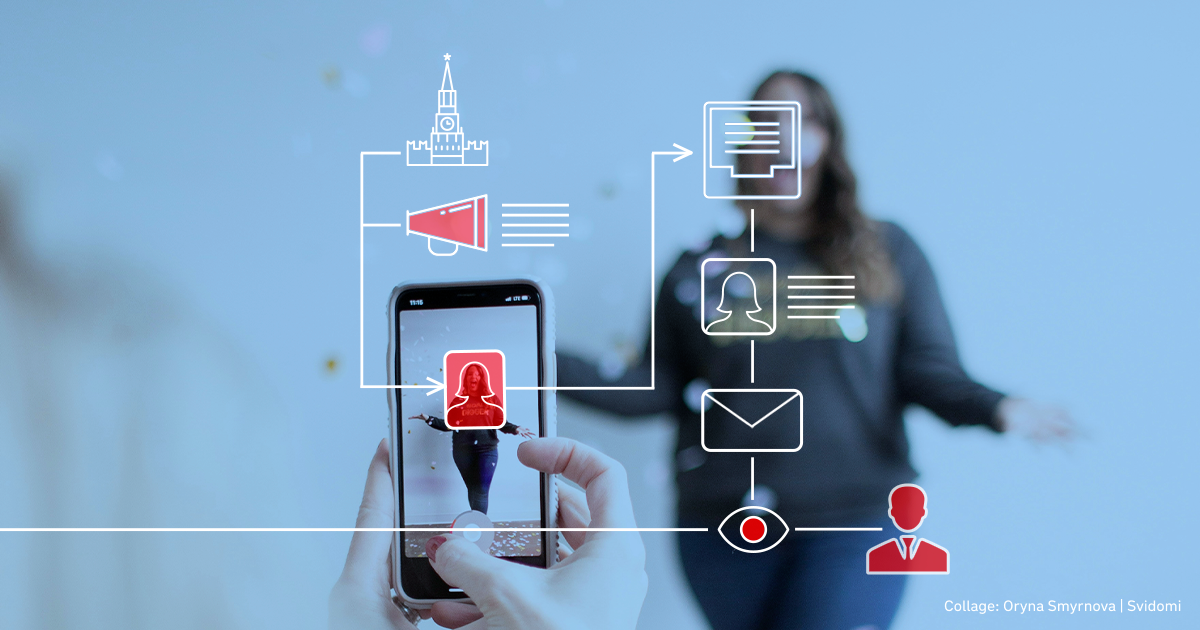
In April 2024, US President Joe Biden signed a bill that would ban TikTok if China-based parent company ByteDance fails to divest the app within nine months.
The European Union and the UK are also considering banning TikTok. The EU authorities — the European Parliament, the European Commission and the European Council — have banned the app from being installed on work phones for all employees. In the UK, government employees have also been banned from using TikTok.
TikTok has been accused of 'promoting propaganda', including Russian agendas, collecting and storing massive amounts of user data, and providing this data at the request of officials of the ruling Chinese Communist Party. All of this makes TikTok potentially dangerous to use.
Svidomi uses the example of Ukraine to explain why TikTok is considered a threat to national security.
How TikTok's algorithms trap users in propaganda echo chambers
Echo chambers, or closed environments on social media, are the result of using algorithms to promote content to users. Social networks collect the following data: age, gender, country, location, language used, reactions to posts, comments, etc. Some collect financial data and access SMS messages. Meta, which owns Facebook, Instagram, Messenger and Spotify, collects some of the largest user data in the world.
Based on this data, algorithms serve up content that the user may enjoy. In this way, the user stays on the platform and also receives content that he or she likes. This is how they get into the echo chamber.
Olha Snopok, a digital platforms analyst at the NGO OPORA, tells Svidomi that social media cannot abandon algorithms. They are interested in keeping users on the platform and consuming advertising, which is the main source of income for social networks.
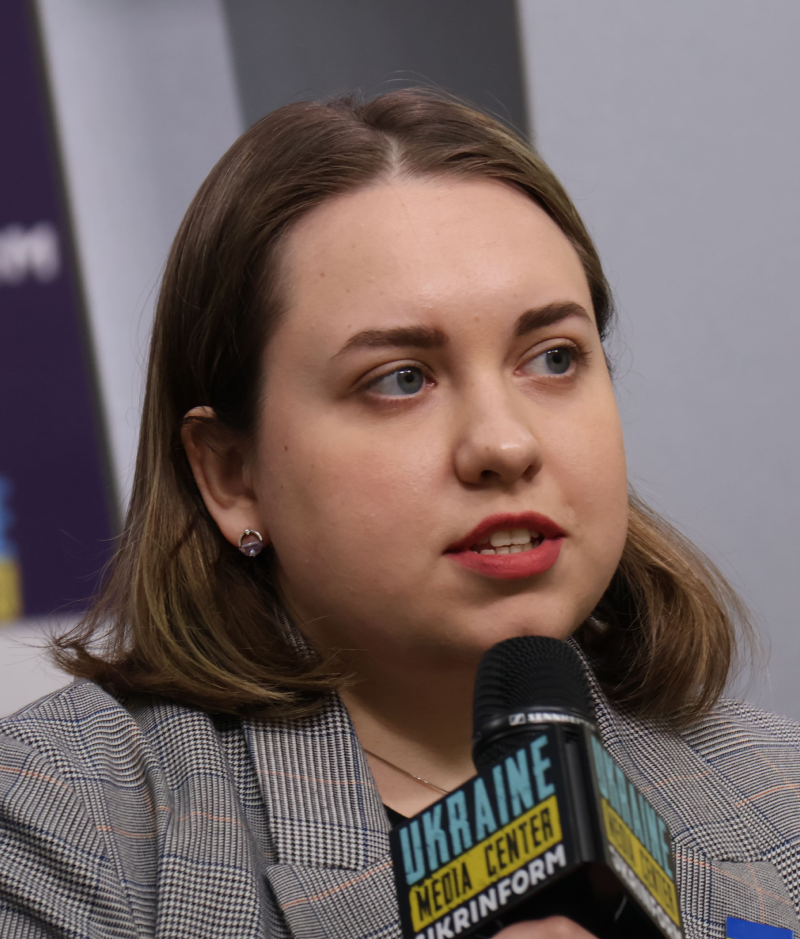
TikTok's main task, like that of any social network, is to attract new users to the network and to retain the attention of those who have already joined. To do this, TikTok has developed algorithms to select the most relevant content for users,
Snopok explains.
The New York Times described how TikTok's algorithms work. The social network collects data on time spent viewing content and interaction, such as likes, shares, comments, and saves. Based on this data, algorithms serve users similar content to keep them on the social network as long as possible.
The Wall Street Journal also explained how TikTok moderates and monitors content. If a user regularly watches sad or depressing videos, the algorithm starts offering them similar videos, sometimes with calls to suicide or self-harm, even though the social network's rules say such content should be removed. The algorithm takes into account every second of viewing before the user scrolls through the video. In this way, the user ends up in an 'echo chamber'.
Olha Snopok gives an example of how this works in Ukraine: "If a user watches a video with a negative attitude towards the Ukrainian government and the Ukrainian military for a little longer, they will encounter more and more such videos, and TikTok will offer more and more users who create such content," she explains.
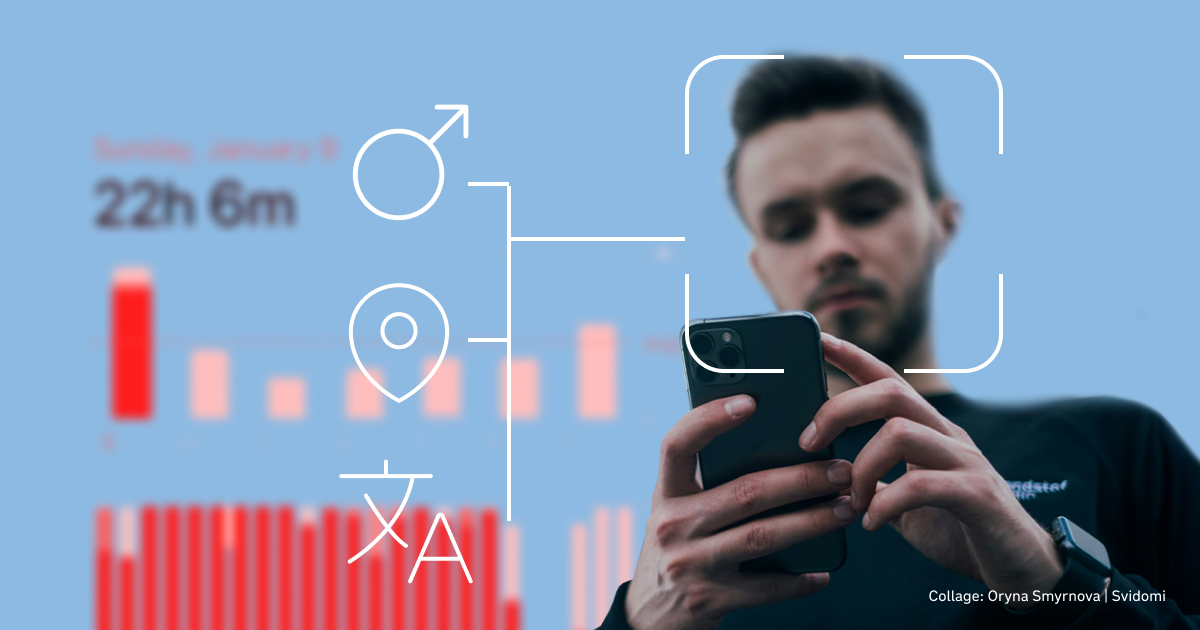
Russia uses TikTok's approach to content distribution and moderation. Media outlet Texty.org.ua studied trends and hashtags on the social network and found that using Russian to search for content increases the likelihood that the algorithm will suggest Russian propaganda users or simply accounts from Russia. The social network does not distinguish between Ukraine and Russia as regions, so it actively serves the content created by Russians
to Ukrainians.
TikTok moderates the content that enters users' feeds from Ukraine very selectively. In 2020, it emerged that moderators blocked the hashtag 'ATO' (Anti-Terrorist Operation, a term used to identify the Ukrainian territory of the Donetsk and Luhansk regions under the control of Russian forces and pro-Russian separatists. A significant part of the ATO zone is considered temporarily occupied territory of Ukraine — ed.), which was used by the Ukrainian military to disseminate content about the war in the Donetsk and Luhansk regions. After Russia's full-scale invasion of Ukraine in 2022, TikTok did not officially announce any blocking or increased moderation of content for users from Ukraine. As a result, Ukrainians continue to receive videos from Russian propaganda media, Russian artists and comedians collaborating with the state, etc.
In 2024, researchers from the American organisation Brookings noticed that accounts linked to Russian propaganda media had become more active on TikTok. They were uploading 10 or more posts a day, 'spamming' the algorithms that picked up their videos and offered them to users. It works: 44 accounts have collected over 3.5 million engagements from users since the beginning of 2024.
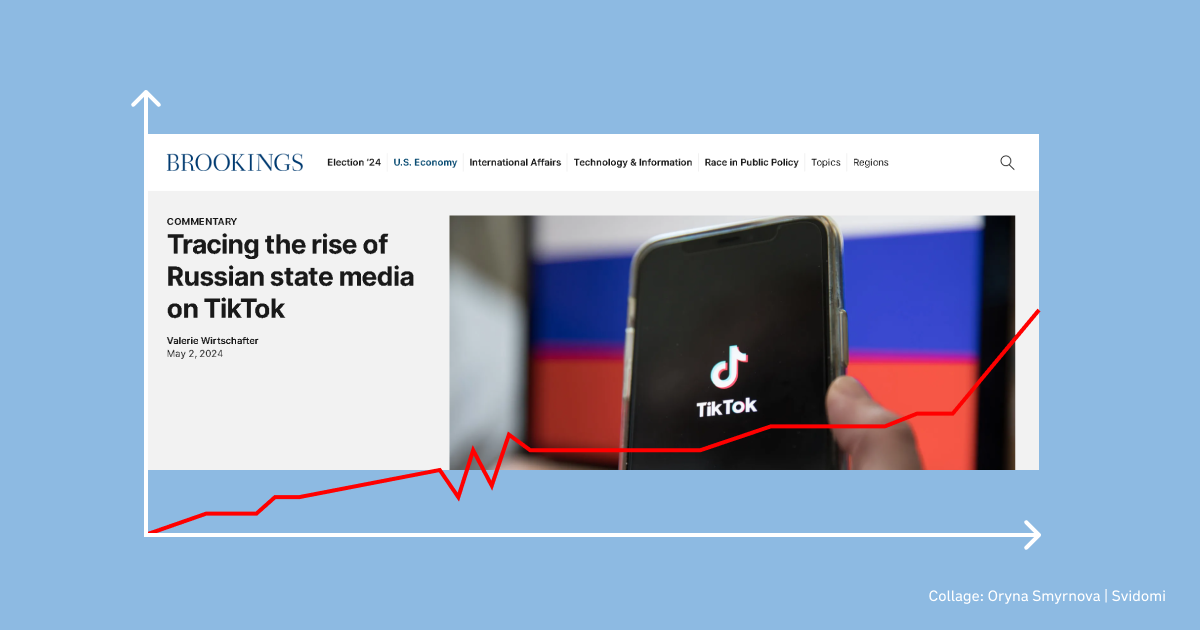
In Ukraine, Russian propaganda uses TikTok to promote not only its media accounts but also bloggers' accounts and even fakes. For example, Texty.org.ua notes that Russians often create fake profiles of well-known Ukrainian public figures and thus spread content discrediting the government and the armed forces. Russians also use sensitive topics in Ukrainian society, such as corruption, distrust of the authorities, and the church issue. Since the beginning of the full-scale invasion, the number of Russian fakes and manipulations on mobilisation has increased, according to the Spravdi Centre for Strategic Communications. All these videos are aimed at evoking emotions, primarily anger. Thus, people react by sharing or liking them. The algorithm picks up on the reactions and promotes the video further.
At the same time, Russian propaganda on TikTok promotes 'peace' narratives. Using common hashtags related to Ukraine, accounts publish content calling for the two countries to "make peace" because "the Russian army is still stronger" and so on. Russians diversify their content for Ukrainians as much as possible to reach all possible categories of users.
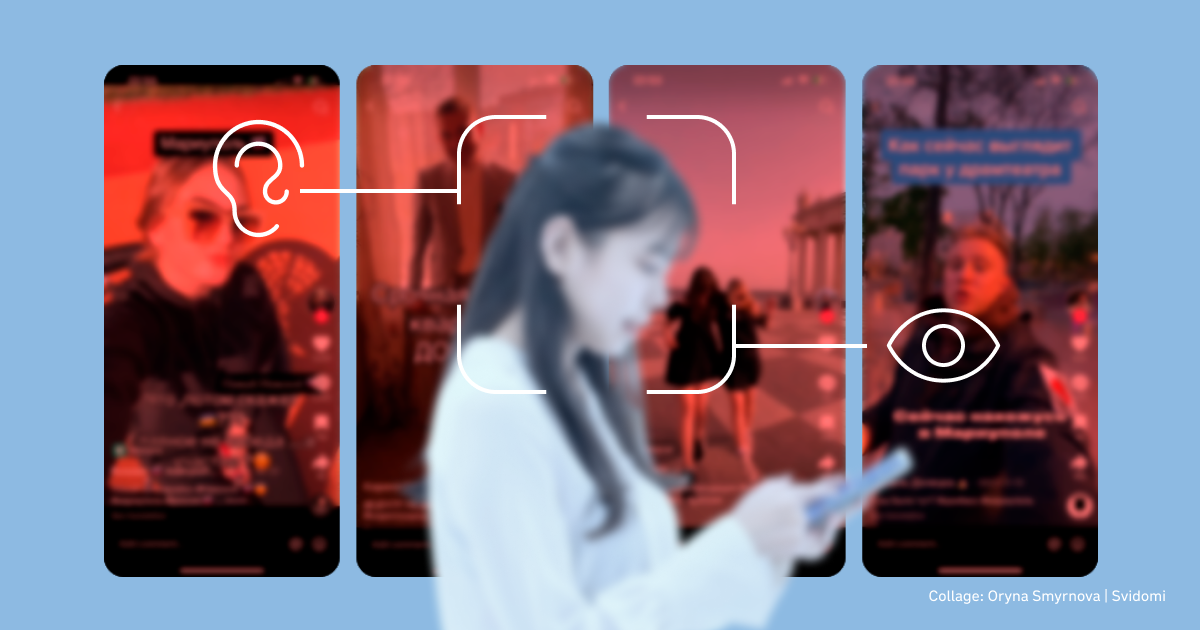
Analyst Olha Snopok explains why TikTok has become such a centre of Russian propaganda in Ukraine: "TikTok doesn't really care what content is popular, and therefore, often the trends that TikTok's algorithms eventually create are harmful and even dangerous. The algorithms are set up to make certain pieces of content not just popular but super popular and viral."
According to the civil network OPORA, TikTok is not a popular network among Ukrainians. It is losing out to Telegram, Facebook, Instagram, and YouTube. Its audience is about 23% of Ukrainians on social media, but it is actively gaining popularity among young people.
Olha Snopok says that TikTok can impose a threat to Ukraine's national security because of its content moderation and algorithms that affect young social media users.
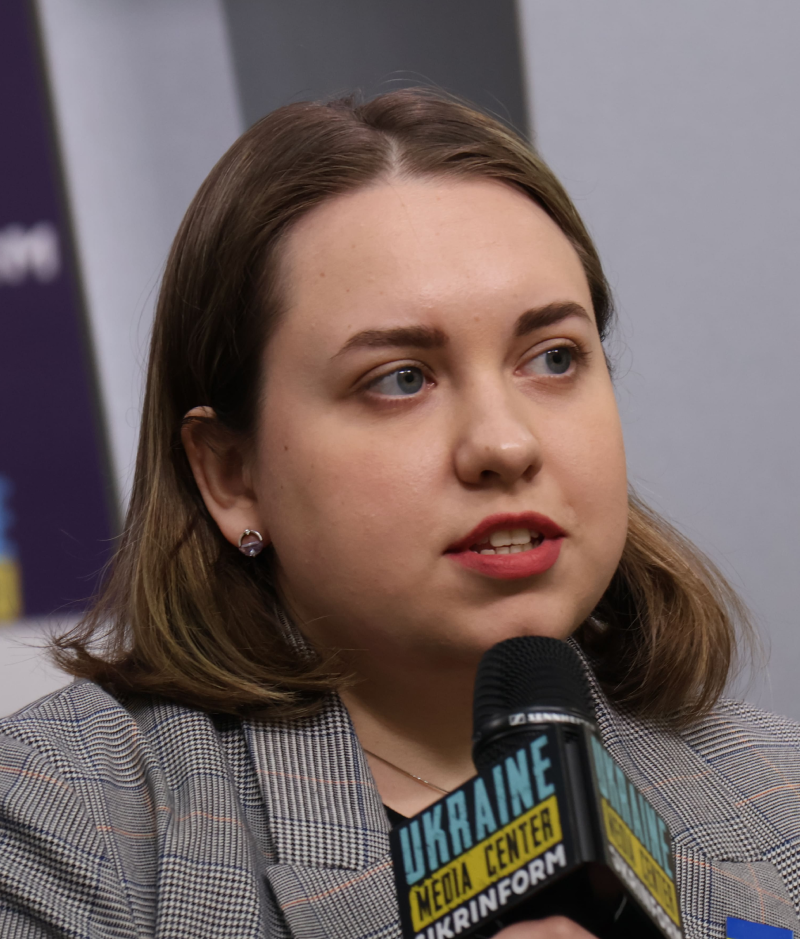
TikTok is another source of Russian disinformation. However, compared to other social networks, such as Telegram, TikTok is a platform primarily for influencing young people. In addition to the already standard danger that Ukrainian users will consume overtly Russian or pro-Russian content, which is more or less present on any platform, TikTok is the best platform for drawing teenagers and young people into the Russian-language information space,
she concludes.
China's control over TikTok
TikTok is owned by a Chinese company called ByteDance. They launched it in 2017, and by 2019, it had become the most popular app in the world, with 693 million downloads in a year. Growth continued in 2020, with 850 million users downloading it to their devices. As a result, TikTok quickly became a rival to Instagram, especially among users aged 18 to 25.
The social network's growing popularity attracted the attention of China's communist authorities. In 2018, the Chinese government forced the company to give hiring preference to Communist Party members. That included censors, who launched an intensified campaign to "cleanse the internet" of not only politically unacceptable content but also anything that contradicts China's "core socialist values".
In 2023, Australian social media researchers commissioned by the Australian Senate Committee on Foreign Interference through Social Media conducted an investigation into ByteDance's links to the Chinese Communist Party. They found that the company was, in fact, controlled by government officials from China's ruling party.
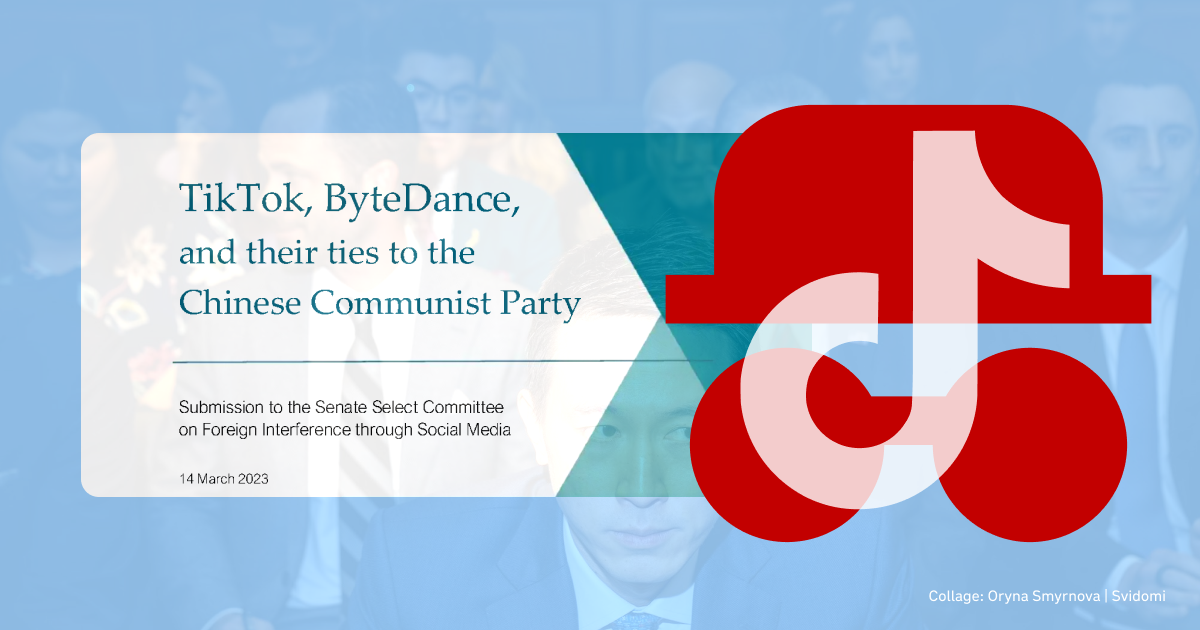
Olha Snopok explains how it all works. The Chinese government owns only 1% of ByteDance (a requirement for licensing in China). This stake gives a government representative a seat on the company's board of directors, which means the government has access to internal information about the company's affairs and influence over decision-making.
"The fact is that there is no such thing as a 'private' company in the People's Republic of China: in every company, members of the Chinese Communist Party must set up a party cell with at least three or four party members. Employees of private companies must also put the interests of the party first and "protect its secrets at all costs", the analyst says.
In April 2024, Forbes published an article in which it said that ByteDance's Beijing office had direct influence over the company's other offices, including in the US. The company has been transferring employees from the Beijing office to the US office, giving preference to American employees with a high level of Mandarin. The top management of the US office is completely subordinate to the Beijing office. Decisions about content moderation in the US are made in China, Forbes writes.
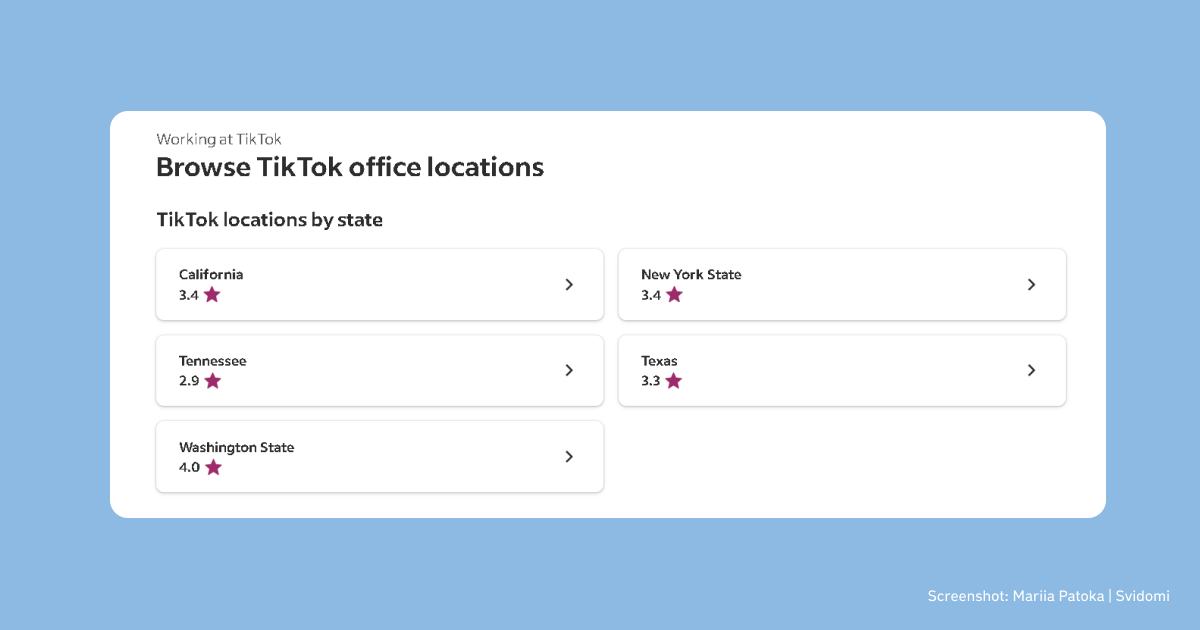
Olha Snopok says that this control of ByteDance's Beijing headquarters over all others is no coincidence. TikTok has been actively used to collect data and spy on journalists and US and European government officials at the request of the Chinese Communist leadership.
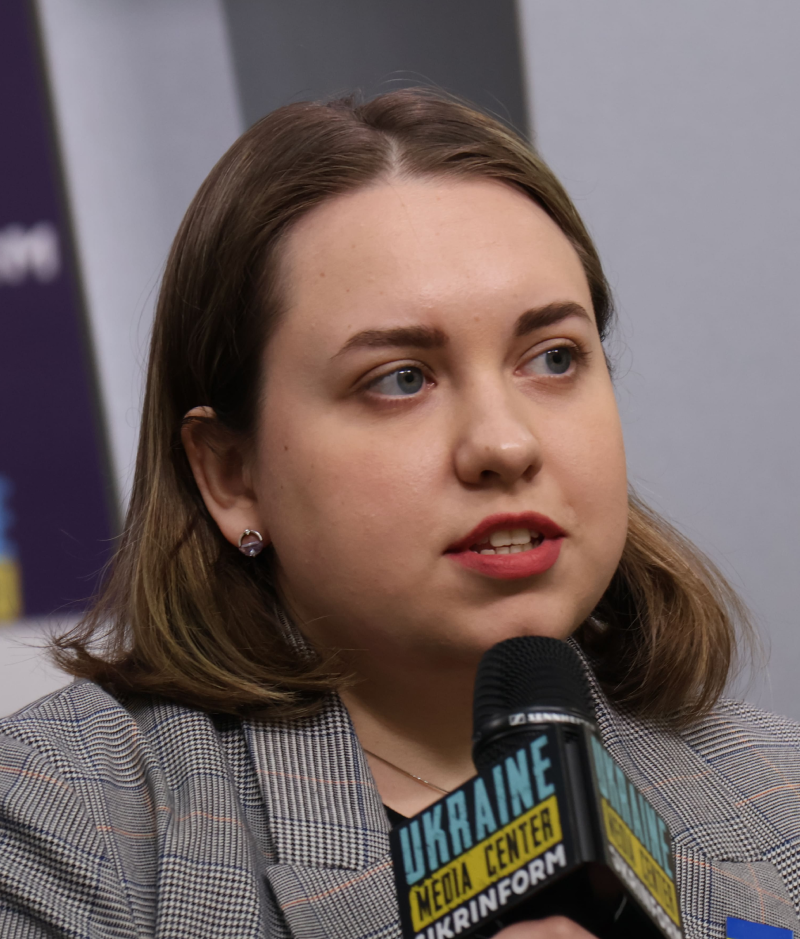
We can say that China has tight control over ByteDance and uses TikTok to track the movements of the Ukrainian military, collect classified information, etc.,
she concludes.
The US Congress is demanding that ByteDance sell its American stake in TikTok. In this way, the US is attempting to break the links between the Beijing office, the Chinese government, and the American company that runs the social network. ByteDance, in turn, is filing a lawsuit against this decision, arguing that the threat of a ban violates human rights and freedoms enshrined in the US Constitution.
Ukraine's approach to TikTok regulation
In April 2024, the National Security and Defence Council's Centre for Countering Disinformation announced that it would work with the TikTok administration" to counter the spread of Russian propaganda on the network". Earlier in March, the Centre provided the TikTok administration with a list of channels spreading Russian disinformation.
However, the deputy secretary of the National Security and Defence Council, Serhii Demediuk, told the media outlet Dev.ua that after more than a month of negotiations, "TikTok's representatives are slow to respond to our requests, they are scrutinising us closely and observing our reactions."
In 2023, TikTok introduced the mark for state-affiliated media accounts. Russian propaganda media, such as RIA Novosti, received such a mark. In this way, TikTok tries “to ensure people have accurate, transparent, and actionable insight when they engage with content from media accounts that may present the government’s viewpoint.” However, they are not as popular as the accounts of ‘independent’ Russian-speaking bloggers, which Russia uses to spread propaganda in a non-intrusive way.
In 2022, TikTok left Russia. It reduced the number of employees and stopped updating the app in the country. In fact, the company moved to Qazaqstan. The city of Almaty is home to an office that develops the social network in Eastern Europe, according to job postings on TikTok's official corporate website. The requirements for candidates include knowledge of the Russian language. By 2024, the app was available in Russia again, allowing users to comment and upload videos.
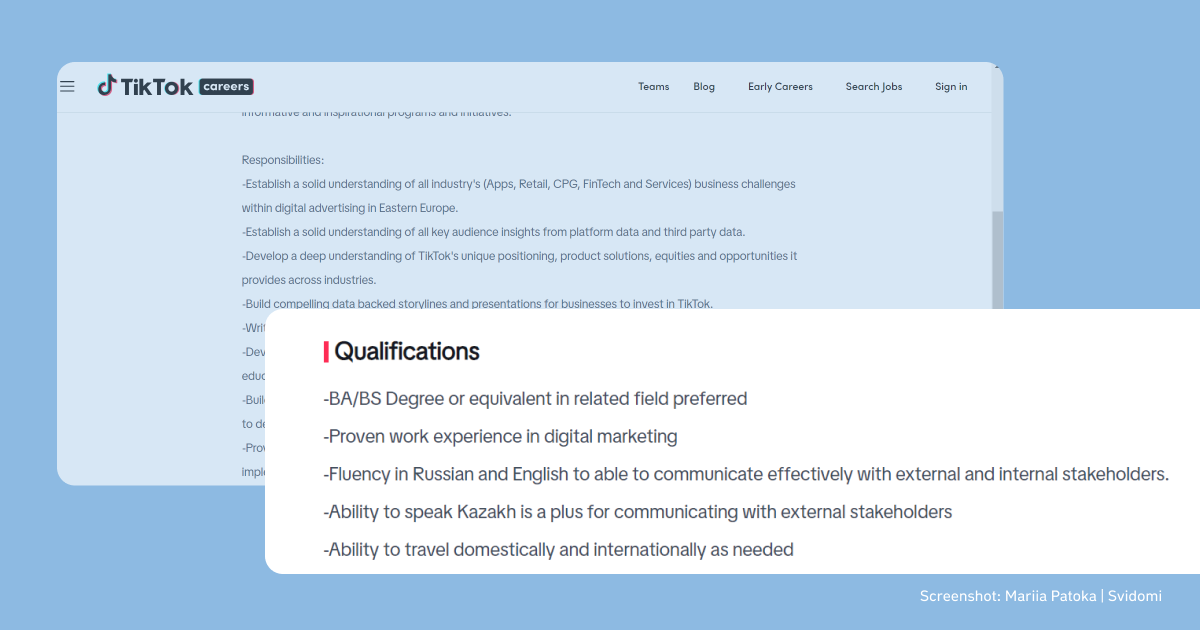
Analyst Olha Snopok says that this cooperation between the Centre for Countering Disinformation and TikTok is about blocking Russian propaganda accounts exclusively for users from Ukraine. The accounts themselves remain active.
"It's obviously better than before because no Ukrainian government agency or specialised organisation had such direct contact with TikTok before. But in fact this is only a small part of the problems that exist with this social network. The main complaint against TikTok is that this social network collects too much private data about its users, and this data can later be used for manipulation, forecasting, and so on. Blocking Russian accounts on the territory of Ukraine will not solve this problem, but it will somewhat reduce the share of Russian content".
TikTok is owned by a Chinese company and therefore stores data in China, as confirmed by the American publication Forbes. China also stores financial data, as well as data from the so-called 'Creator Fund' of bloggers from the US and EU, with the largest number of followers. It is likely that Ukrainian users' data is also stored in China or may be available to the Chinese Communist government. The spread of Russian propaganda and the social network's specific algorithms raise the question of regulating TikTok at a legislative level, up to and including a complete ban.
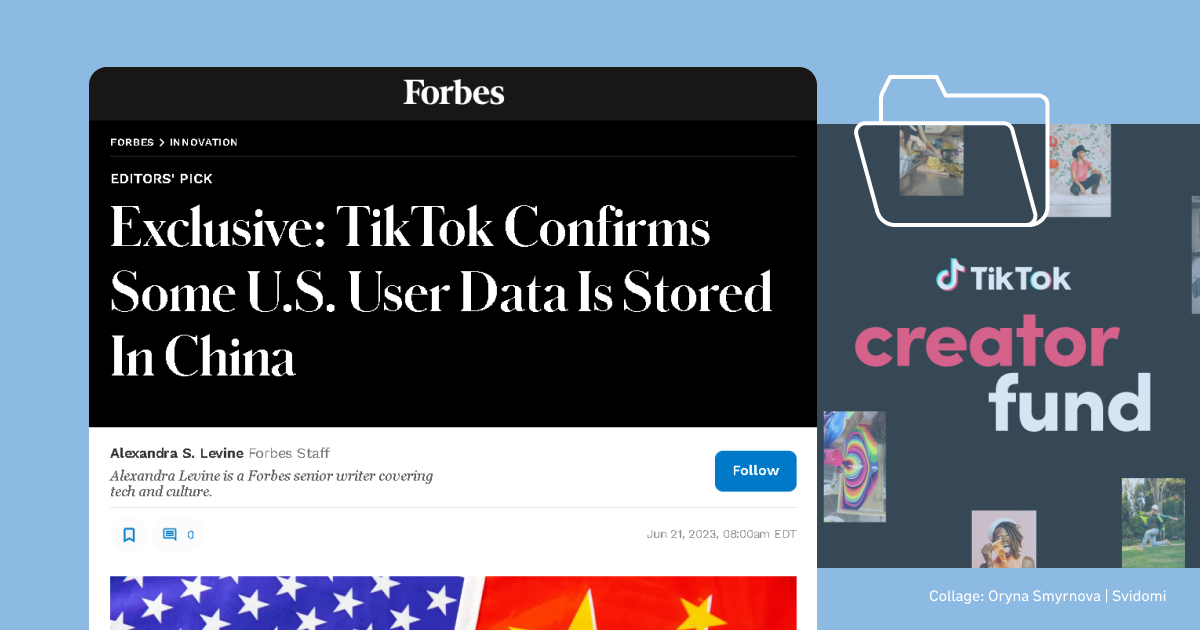
The Law on Media, adopted in Ukraine in 2022, allows accounts on social media and video hosting sites (such as TikTok — ed.) to be considered media. TikTok users have the right to register as media and work in the Ukrainian information sphere. However, the law does not regulate the work of the platforms themselves, such as TikTok. The so-called 'Google Law', adopted in 2021, requires large platforms that provide electronic services, such as Google, Facebook and Netflix, to register in Ukraine and pay taxes. But it does not regulate their activities. TikTok is also covered by the law but has not yet registered in Ukraine.
Olha Snopok says the Ukrainian government should not rush to regulate TikTok.
"We do not understand what kind of TikTok we will be dealing with in 2025 - whether it will continue to be a company with Chinese roots and influence or whether we will be interacting with American approaches to regulating social media. The creation of any regulation is a long and complicated process, so we cannot afford to rewrite a law a hundred times, but rather to create a fully-fledged legal framework that will only need to be slightly adapted to new realities," she explains the impact of the situation with the possible ban of the app in the US.
Ukraine can adapt the practices of other countries and EU institutions to ban the use of TikTok by civil servants, officials, law enforcement officers and people's deputies, says Olha Snopok. For example, Oleksii Honcharenko, a people's deputy, regularly streams meetings of the Verkhovna Rada and posts extracts on TikTok. Journalists were not allowed to work in the Rada until the May 2024, getting banned from attending parliamentary sessions since 24 February 2022. The Ministry of Digital Transformation and the Centre for Countering Disinformation also have TikTok accounts.


